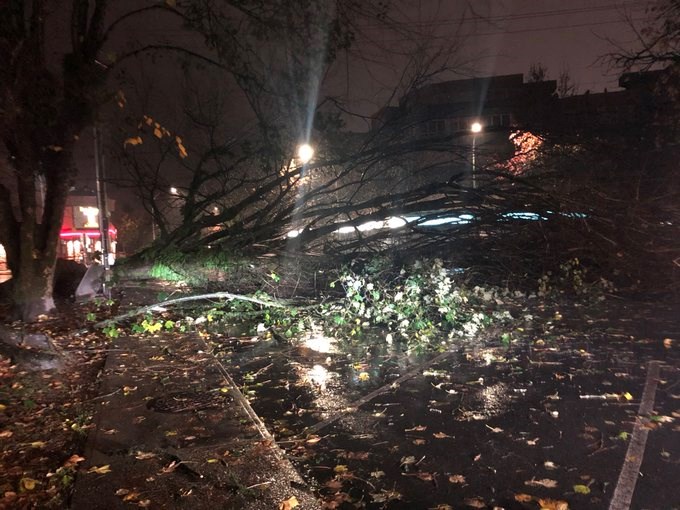Fall is making its presence known in the Tri-Cities, dumping a dusting of snow in Coquitlam, raising tides in Port Moody and knocking down trees in Port Coquitlam.
It’s been a strange few days of weather in the region, to say the least.
And while Tuesday’s (Nov. 9) so-called "weather bomb" didn’t strike the Tri-Cities with too much force, work crews were out removing downed trees.
A large tree toppled in the area of Flint Street and Coquitlam Avenue, at Aggie Park in Port Coquitlam.
City crews also cleaned up a large cottonwood and a few small alders that fell along the PoCo Traboulay Trail near Prairie Avenue.
In Port Moody, a high tide nearly submerged the shoreline trail, while in Coquitlam, snow dusted homes on Westwood Plateau.
And, there was hail in Port Coquitlam (see video in Tweet near bottom of story).
Residents, meanwhile, captured the intense weather systems with photos and video, posting them on social media.
For Remembrance Day tomorrow (Nov. 11), Environment Canada is calling for clouds in the morning before bringing rain in the afternoon with an expected high of 10 C.
Rain is also forecasted throughout the weekend, with some breaks, including a mix of sun and cloud on Saturday (Nov. 13).
Meanwhile, many British Columbians are "overconfident and underprepared" to cope with storm-triggered power outages, a new BC Hydro report shows.
In a survey commissioned by the electric utility last month, more than half of Metro Vancouver residents said their region was the most prepared for storm-related outages in the province. That’s despite ranking as the least likely to prepare for such an event.
"Storm season is off to an early start this year — numerous atmospheric river events and a bomb cyclone brought high levels of wind and precipitation to B.C. over the past couple of months," notes the report, released less than 72 hours after a rare supercell tornado touched down at UBC.
B.C. has already seen an increase in the average number of storms in a given year.
In 2014, there were 52 storms across the province, but in the last few years, B.C. has averaged 117.
Tri-City residents are encouraged to plan, and stock up, for a power outage, as more storms are expected to occur with climate change.
Local trees may have been weakened by June's record-breaking heat wave and summer drought conditions, making them easier to topple over in a wind storm.
See here for full story on climate change impact on local weather and why you should prepare for power outages.
- with files from Stefan Labbé, Glacier Media





